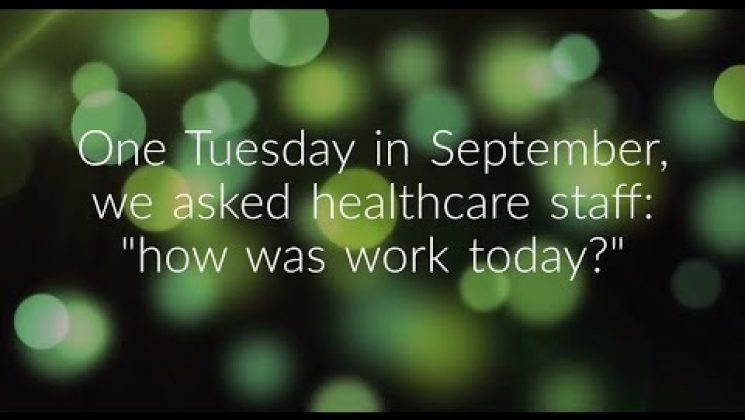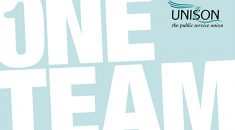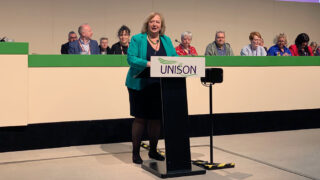Almost half of NHS workers on the front line of patient care say there are not enough staff on their shift to ensure patients are treated safely and with compassion, a new survey published today (Friday) by UNISON reveals.
The study illustrates the effect of chronic understaffing in the health service, with unfilled posts and uncertainty about the future status of many workers having an impact on patients, says UNISON.
The snapshot survey Just Another Day examined attitudes and experiences for staff across the UK during one working day – the 24 hours of Tuesday 18 September 2018. The aim is to paint a picture of how staff felt about the pressures they were under.
The public service union, which represents hundreds of thousands of people in a range of health professions, is warning the government it must pump significant funds into the NHS to fix the problems caused by years of austerity. In addition, ministers must put a greater focus on apprenticeships to usher more people into healthcare professions.
Almost half (45%) of the respondents who were directly involved with patient care (6,778 out of 15,134 respondents) said there were not enough staff on their shift to deliver a safe, dignified and compassionate service.
Some departments were more severely affected than others. Hardest hit were those in acute inpatients where almost three in five (59%; 1,381 out of 2,345) said staffing was insufficient. It was also a serious issue for those in mental health (45%; 996 of 2,203), primary care (41%; 777 of 1,893) and community health (36%; 642 of 1,794).
Concerns about staffing levels come despite the number of bank or agency staff being used on the day. Nearly half of respondents (47%) said their service relied on bank staff on the day of the survey, mainly to fill nursing roles but also healthcare assistant posts, administration and a variety of other positions.
UNISON’s survey also raises other serious concerns. One in seven (14%) of respondents rated the quality of care as “compromised” and one in six (15%) said patient safety was compromised on the day of the survey.
The findings are based on responses from more than 18,000 healthcare staff from across the UK including nurses, healthcare assistants and support workers, students, ambulance service staff, cleaners and porters. The vast majority (90%) worked in the NHS, the remainder from the private and voluntary sector.
Other findings of the report include:
- Almost two fifths of respondents (38%) worked longer than their scheduled hours, in many cases unpaid
- Nearly one in six (16%) were subjected to violence, aggression and/or verbal abuse during their shift
- More than a quarter (26%) reported extremely high stress levels.
The desperate state of staffing is illustrated by the most recent figures for the NHS in England, issued in November 2018. These indicated the service was short of almost 41,000 nurses (nearly 12% of the entire nursing workforce), with the total number of vacancies for all occupations close to 103,000.
UNISON outlines a number of specific recommendations to the government in its report. These include:
- The NHS must be given a significant increase in funding to tackle the serious cuts to the service brought about by the squeeze on funding. Current resource pledges are not enough to meet patients’ needs
- Legislation must be introduced for mandatory safe-staffing levels in England and Northern Ireland, building on the lead of Wales and Scotland
A renewed focus is needed on apprenticeship schemes as a way to improve access routes into healthcare professions. Changes to healthcare student finances are also essential to encourage training and recruitment to the service
- The investment in improving pay and rewards must be continued in order to attract and retain health service staff. Stress and violence must be tackled to improve the working environment.
UNISON head of health Sara Gorton said: “This survey shows the extent to which crisis level staffing has become normal across the whole NHS.
“These are long-term, systemic factors not being properly addressed. The government must give the system the funding needed to tackle these issues. But hearteningly it also shows the dedication and compassion these hard-working committed staff continue to show at the most trying times.”
Notes to editors:
– Despite the enormous pressures, the report shows staff continue to go the extra mile to help their patients:
“I dyed an elderly lady’s hair after my shift (not including the hour I stayed late doing extra clinical work).” Registered nurse, Golders Green, north London
“I gave a crying baby a cuddle for 15 minutes, taken out of my break on a night shift, so a tired first-time mummy could close her eyes for a few minutes.” Registered nurse, Accrington, Lancashire
“A patient could see me struggling, took my hand and told me how great I had been and how good my care was. That meant so much to me.” Registered nurse, Birmingham
– The survey was based on responses from more than 18,000 staff. Click here to access the full report.
– In 2016, Wales became the first country in Europe to introduce safe staffing levels for nurses. Legislation is currently going through the Scottish Parliament to introduce safe staffing with a requirement for ‘appropriate’ numbers (rather than a method to calculate the levels, as has been adopted in Wales).
– UNISON is the UK’s largest union, with more than 1.3 million members providing public services – in education, local government, the NHS, police service and energy. They are employed in both the public and private sectors.
Media contacts:
Anthony Barnes T: 020 7121 5255 M: 07834 864794 E: a.barnes@unison.co.uk
Liz Chinchen T: 0207 121 5463 M: 07778 158175 E: l.chinchen@unison.co.uk





